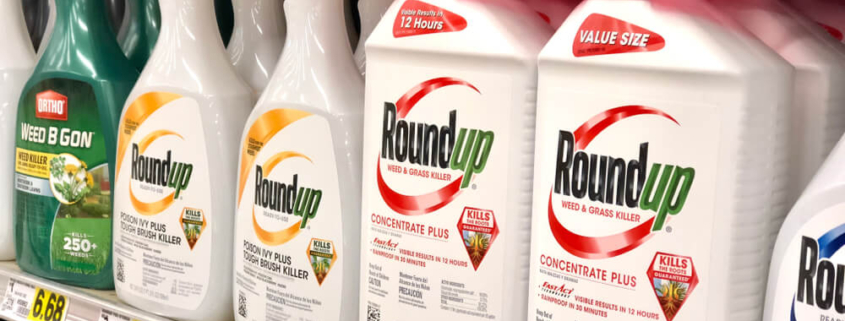Popular Herbicide Roundup Linked to Non-Hodgkin Lymphoma
Roundup is the most popular herbicide in the world and it is widely used by farmers, landscapers, groundskeepers, commercial gardeners, and even home gardeners. Roundup was first introduced commercially by Monsanto Company (recently acquired by Bayer Corporation) in 1974. Today, it has been used in over 160 countries around the world to kill various types of weeds. In recent years, thousands of individuals have filed lawsuits claiming that glyphosate, the product’s active ingredient, causes non-Hodgkin lymphoma and several other forms of cancer and other conditions.
Roundup has been widely marketed for several decades. The product’s rise in popularity was aided in the late-1990s when Monsanto introduced genetically-modified soybeans, corn, cotton, and other crops that were glyphosate-resistant. Use of these “Roundup ready” crops gave farmers and gardeners the ability to spray massive amounts of Roundup to kill weeds without having to worry about harming their plants.
In the subsequent years, Monsanto introduced several varieties of Roundup, including Roundup Ready-to-Use, Roundup for Lawns, and Roundup Max Control. Monsanto’s flagship product has become the dominant glyphosate-based herbicide in the market, resulting in annual sales that had topped $15 billion by 2015. In 2016, Bayer agreed to acquire Monsanto for $66 billion. Earlier this year, the U.S. Department of Justice approved the acquisition, and the deal was finalized in June.
Roundup and Cancer
In March of 2015, the International Agency for Research on Cancer (IARC), a division of the World Health Organization, released a report concluding that glyphosate was “probably carcinogenic to humans”. The report pointed to evidence of non-Hodgkin lymphoma in individuals from the United States, Canada, and Sweden who had been exposed to glyphosate since 2001.
Another study in 2003 of more than 3,400 Midwest farm workers by the International Journal of Environmental Research and Public Health found that farm workers who were exposed to glyphosate had higher rates of non-Hodgkin lymphoma. Glyphosate has also been linked to conditions such as multiple myeloma, leukemia, liver and kidney damage, abnormal fetal development, lower birth rates, and miscarriages. Glyphosate-based herbicides have now been banned in many countries, including most countries in Europe and South America.
Roundup Lawsuits
Since the 2015 IARC report, thousands of lawsuits have been filed against Monsanto Company alleging that Roundup causes cancer and that the company has been aware of this fact for many years. More than 400 cases have been consolidated for handling as multidistrict litigation (MDL) in U.S. District Court in San Francisco. This past July, U.S. District Judge Vince Chhabria ruled that the plaintiffs had put forth reliable evidence that Roundup can cause cancer and allowed the cases to move forward.
In addition to the federal litigation, there are over 8,000 lawsuits that have been filed in state courts, including cases in Missouri, California, Montana, and Delaware. The next case that is currently set for trial is Ronald Peterson and Jeff Hall V. Monsanto, which is scheduled to begin on February 5, 2019 in St. Louis Circuit Court.
Jury in California Awards Plaintiff $289 Million in World’s First Roundup Cancer Trial
In August, a jury for the Superior Court of California ordered Monsanto to pay $289 million in damages to Dewayne Johnson, a former school groundskeeper who used Roundup regularly during the course of work. Johnson, 46, is a father of two who was given an expedited trial because he is said to be nearing death. As pest manager for a county school system, Johnson applied Roundup 20 to 30 times per year. The jury found that Monsanto had failed to warn Johnson and other consumers of the cancer risks posed by Roundup weed killers. Johnson was awarded $39 million in compensatory damages and $250 million in punitive damages.
Know your Legal Rights
The success of recent Roundup litigation has helped pave the way for others who have developed non-Hodgkin lymphoma and other conditions after repeated exposure to Roundup to receive justice. If you or someone close to you has developed cancer after being exposed to a glyphosate-based herbicide, it is important to speak with an experienced attorney, so you fully understand your rights and options.
For a free consultation with one of our skilled personal injury attorneys, call Gardner Law Office today at 228-436-6555, or you may send us a secure and confidential message through our online contact form.



